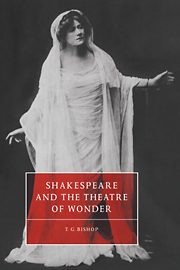Book contents
5 - The Winter's Tale; or, filling up the graves
Published online by Cambridge University Press: 07 December 2009
Summary
O what venerable creatures did the agèd seem! Immortal Cherubims! And the young men glittering and sparkling Angels, and maids strange seraphic pieces of life and beauty! I knew not that they were born or should die; but all things abided eternally.
Thomas TraherneGib Deine Hand, Du schön und zart Gebild!
Bin Freund und komme nicht zu strafen.
Sei guten Muts, ich bin nicht wild.
Sollst sanft in meinen Armen schlafen!
Der Tod und das MädchenDum stupet et medio gaudet fallique veretur,
rursus amans rursusque manu sua vota retractat;
corpus erat: saliunt temptatae pollice venae.
OvidShakespeare seems to have been the first English dramatist to give his plays “poetic” titles, by which I mean not high-flown ones, but ones that stand in a complex figurative relation to the plays they name. Earlier dramatists offered proverbial titles such as Enough is as Good as a Feast or Like Will to Like, but this is not quite the same thing. The practice begins as early as The Comedy of Errors and Love's Labours Lost and reaches a kind of climax with Twelfth Night or What You Will. Given this attentiveness to the resonance of title, we ought especially to pay attention when one of the plays makes a point of citing its title during the action. It does not happen very often, but when it does it orients us strongly on where the playwright himself sees the network of complex interrelations having one of its primary interpretive nodes. This is especially true of his comedies, for which there is a less neutrally designating set of title conventions than for, say, The Life of Henry the Fift or The Tragedy of Julius Caesar (though that “ of” teases).
- Type
- Chapter
- Information
- Shakespeare and the Theatre of Wonder , pp. 125 - 175Publisher: Cambridge University PressPrint publication year: 1996

